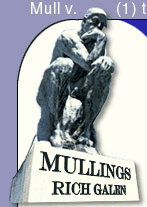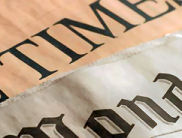

Push Polls
Friday June 29, 2007
Click here for an Easy Print Version
New Feature!
Check out the new Mullings Blog.
You really should take a look.
There's some good stuff there.
Political polls are the currency of people who have to write about politics for a living. We make a living on the results of the "If the election were held today �" question.
Most people who are coherent enough to answer that question understand that the election is not being held today so those results are taken with a grain of salt unless:
1. A candidate comes out first in which case the e-mails pouring out of the campaign touting the result rival those coming out of Nigeria telling me I've won the national lottery.
2. A candidate comes out at or near the bottom in which case the e-mails to "influencers" are designed to remind them that "the election is not being held today." In the modern era, campaigns poll constantly. These "internal" polls are not distributed (unless sub-paragraph 1 above applies). And, this far out, most campaigns are not as interested in who's in first as they are in the movement of the candidates within the poll.
For instance, let's say Candidate A's internal polling shows he is at 27% in Iowa with Candidates B & C trailing at 20% and 15% respectively. If Candidate C runs a bunch of TV ads, or Candidate B has some bad press then Candidate A's campaign would expect to see some movement in its next poll.
If, in that poll, Candidate A stays about the same, Candidate C moves up to 25% and Candidate B drops to 16% then Candidate A's campaign knows, even though they are still in first place, it better crank up its own advertising activity.
Polls also often include issues testing and some, what are called, "open ended" questions which invite the respondent to explain, for example, what they like or dislike about a candidate or an issue. Open ended questions are one way polling firms get to the "most important problem facing America today."
Another and someone less savory poll is what is known as a "push poll." In this type of poll - which is generally frowned upon by big time pollsters - the standard "If the election were being held today" question is asked and the response noted.
Then the pollster reads a series of statements about the opponent, such as:
(Asked of supporters of Candidate Q) If you were to find out that Candidate Q was once arrested for throwing a kitten out of the window of a moving car would you be more or less likely to vote for him.
Then the respondent is asked again whom he or she is supporting.
If Q had actually been arrested for having done that, it would be marginally legit to find out if it moved votes. The problem arises when Candidate Q has never held a kitten in his hands and the whole thing was made up, the only reason for saying that is to start a rumor in the guise of taking a poll.
In the Politico.com newspaper today there is a story headlined: Pollsters Talk Trash about Clinton Rivals. In the piece it becomes clear that the pollster was might have gotten pretty close to a "push poll."
According to Ben Smith's reporting, a respondent was asked "whether his views would be altered by Barack Obama's relative lack of national experience or John Edwards' background as a wealthy trial lawyer."
Well, Obama is just a mite thin on the national experience front, and Edwards did build his fortune being a trial lawyer, so this appears to pass the sniff test.
But the line got a bit blurrier when another Democrat told Smith he had been asked "how the fact that 'Barack Obama failed to vote in favor of abortion rights nine times as a state senator' might affect his vote."
This is different.
Maybe Obama was absent for three of the votes, perhaps four others were not strong enough on abortion rights for him so he voted against, and the last two might have been procedural votes on bills which contained abortion language but which were about something else entirely.
This stuff has been going on since the invention of the telephone, but as Mark Blumenthal told Ben Smith, "The Internet changes the ability of a campaign to keep this [type of polling] secret. It makes it very easy for a handful of respondents to connect with reporters who connect with millions of voters."
Memo to the Hillary campaign: Just about every poll shows you in the mid-30's among Democratic voters. That means 65% want someone else. If you happen to call one of those 65% with this type of poll it is very likely to end up in the newspaper.
On a the Secret Decoder Ring page today: A link to the Politico.com piece about push polling, and VERY funny Mullfoto and a Catchy Caption of the day.
And a link to the new Mullblog!.
--END --
Copyright © 2007 Barrington Worldwide, LLC
Become a
Paid Mullings Subscriber!
(To join the FREE mailing list or to unsubscribe Click Here)

Current Issue |
Secret Decoder
Ring | Past
Issues | Email
Rich | Rich
Who?
Copyright �2006 Richard
A. Galen | Site design by Campaign
Solutions. |





 US & Int'l Papers
US & Int'l Papers